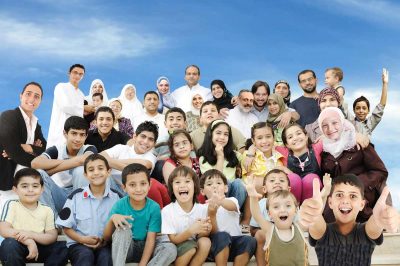Answer
Wa `alaykum As-Salamu wa Rahmatullahi wa Barakatuh
In the Name of Allah, Most Gracious, Most Merciful.
All praise and thanks are due to Allah, and peace and blessings be upon His Messenger.
In this fatwa:
- Muslim Youth present the image of faith, purity of life, courage, sincerity, courtesy, kindness, bravery and altruism.
- Muslim youth should emulate the good examples of their great predecessors.
- Muslim youth should contribute greatly to the development of their communities.
- Muslim youth should represent Islam to other faith communities in the best manner.
Responding to the question Dr. Muzammil H. Siddiqi, Former President of the Fiqh Council of North America, states:
How the Prophet treated the Youth
Abu Qulabah reported that Malik told us that we visited Prophet Muhammad (peace be upon him). We were some young people close in age. We stayed with him for twenty days and nights.
The Prophet was a very compassionate and kind person. When he felt that we wanted to go back to our people, he asked us whom we left behind. We told him (about our people). The Prophet said, “Go to your people, stay with them, teach them and give them (my) orders.”
He mentioned some things that I remember and some I do not remember. The Prophet said,
“Pray as you have seen me praying. When the time of Prayer comes, let one of you give adhan and let the older person among you lead the prayer.” (Al-Bukhari)
Prophet Muhammad was kind and compassionate towards all people, but he was especially caring towards the youth. He treated them with respect and understood their needs. The Prophet built their character and prepared them for the leadership position. He wanted them to teach and lead the world.
Examples of youth mentioned in the Quran
The image of youth in Islam is very dynamic, positive and active. Prophets Ibrahim, his son Isma`il, Yusuf, Yahya, Maryam, the Ashab Al-Kahf or the People of the Cave (may peace and blessings of Allah be upon all of them) were great examples of youths mentioned in the Quran.
The Quran refers to Prophet Ibrahim (peace be upon him) as “fata” or a young man. When he learned the truth, he accepted it without any hesitation, although he had to go through a lot of suffering and pain. Prophet Ibrahim did not bow down to idols of his own people.
He was very respectful to his father, but in the matters of truth he did not compromise with him. Prophet Ibrahim left his home, his town, sacrificed everything but he did not give up his faith in One God (tawhid).
Also, Prophet Isma`il (peace be upon him) was a young man. But he is the example of true obedience and submission to Allah and to the way of his father. His father was a Prophet and a righteous man. When he told him about his vision and God’s Command to sacrifice his only son, Isma`il did not hesitate. Prophet Isma`il said; {My father, do what you are commanded and you shall find me, God willing, among the steadfast.} (As-Saffat 37:102)
Allah accepted the sincere devotion and obedience of both: Ibrahim and Isma`il. Later the same son helped his old father in the building of the Kabah.
Prophet Yusuf is another example of youth in the Quran. He was the most handsome man and was living in the most prosperous situation. Prophet Yusuf was tried by temptations but he kept himself pure. He preferred to go to prison, but he did not succumb to evil desires. He prayed to Allah, {My Lord, the prison is more dear to me than that which they urge me to do…} (Yusuf 12:33)
Prophet Yahya (John the Baptist) is another example of a youth in the Quran who was from the early age pious, righteous, kind and thoughtful towards his parents.
We also have the example of Maryam, the mother of Prophet `Isa (peace be upon him) how noble and pious girl she was. She kept her purity and dignity and Allah bestowed on her a great honor. She became one of the noblest women of the world.
The story of the Ashab Al-Kahf
The Quran also tells us the story of the Ashab Al-Kahf, the People of the Cave, they were not Prophets or Messengers, but they were righteous youths. They believed in their Lord. They refused the pressure of evil rulers who wanted to turn them away from the path of righteousness.
Allah says about them,
{We relate to you their story in truth: they were youths who believed in their Lord, and We advanced them in guidance. We gave strength to their hearts: behold, they stood up and said: “Our Lord is the Lord of the heavens and of the earth: never shall we call upon any god other than Him: if we did, we should indeed have uttered an enormity!} (Al-Kahf 18:13-14)
Among the Companions of the Prophet, we have many examples. Ali, Faitmah, Asma, Sumayyah, Aishah, Abdullah ibn Umar, Abdullah ibn Abbas, Talha, Zubair, and many others were youth when they accepted Islam and they made great contributions in the history of Islam.
In Islam, youth present the image of faith, purity of life, courage, sincerity, courtesy, kindness, bravery and altruism.
In Islamic spiritual history, there were people who were known as fata or fityan and a movement was established known as futuwwah movement. Futuwwah goes back to a very early period. Its purpose was to cultivate high moral and spiritual qualities among youth.
Fata was known as the young man who was brave, generous and faithful. The fata was the one who hated no one and who cared for everyone.
📚 Read Also: Three Young Companions Empowered by the Prophet (PBUH)
Some people said that the real fata was “one who honors those senior to him, who shows compassion to those who are junior or under him and who prefers over his own self those who are his peers.” It was said: “There is no fata like Ali (may Allah be pleased with him) and there is no sword like Dhul Fiqar (or Ali’s sword).
It is clear from the above that there is a great role for Muslim youth to play. With this rich legacy demonstrated above, it makes it incumbent upon the Muslim youth to emulate the good examples of their great predecessors.
Our focus on the youth does not abnegate the old from sharing the responsibility as with concerted and systematic efforts between the young and the old high hopes will be achieved.
Almighty Allah knows best.
Editor’s note: This fatwa is from Ask the Scholar’s archive and was originally published at an earlier date.



